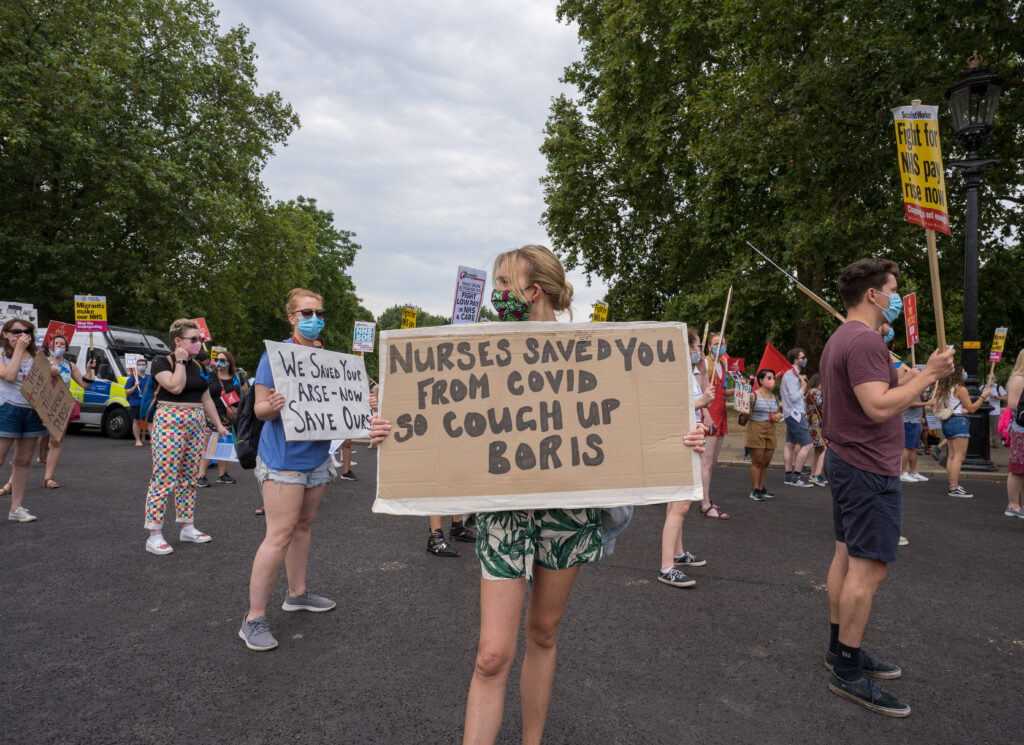Health unions have written to the PM urging him to intervene and speed up the NHS pay review process. The letter from 14 unions, including UNISON, the RCN, and Royal College of Midwives says “hospitals are stretched to the limit”, with many “demoralised and traumatised” staff facing burnout, such is the pressure they’re under.
They are calling for a substantial pay rise – between 12.5% and 15% – to restore levels of pay, as rises have failed to keep up with inflation over the last decade, with the most experienced front line nurses seeing a real-terms pay cut of around £6144 per year.
The letter was sent on the final day for submissions to the NHS Pay Review Body, which advises the government on pay rises for the NHS. Staff are at the end of a three-year pay deal with a pay rise due in April, but the NHS Pay Review Body is not due to report until May, and the unions say, this will mean a pay rise is not likely to happen until July at the very earliest.
A rise has been promised by the chancellor, Rishi Sunak, but not until after the formal NHS pay review body reports back in May. In recent years the average pay of NHS staff in England across all levels has lagged far behind inflation, leading to a significant decline in real total pay between 2010-11 and 2020-21.
Health Secretary Matt Hancock has said any pay rise must be determined by ‘affordability’. As part of its evidence to the NHS Pay Review Board, the unions have addressed this issue with a report published 18 January by the think tank London Economics based on independent data, which looks at the bigger picture; it notes the benefits to the economy of giving NHS staff a substantial pay rise, not just the loss to the treasury. The researchers say 81% of the cost of a 5% or 10% pay rise would in fact be recovered by the government via higher tax payments and more spending in local businesses. In addition, a substantial pay rise would reduce the costs of future recruitment and retention.
The cost to the exchequer of a 10% pay increase would be £3.4bn this year on paper, note the researchers, but because of the wider benefits of increasing the pay of NHS staff, the actual cost would be down to just £660m.
A survey by commissioned by UNISON, published 18 January, found that a huge majority of NHS staff say the government doesn’t value their extraordinary efforts during the pandemic and many are considering their future in the NHS.
The survey of 10,000 NHS staff reveals that health workers feel deeply dissatisfied with their treatment, with only one in ten (10%) saying the government values NHS staff and more than four out of five (85%) angry at how NHS staff are being treated by the government. Almost two thirds (64%) said the government’s approach to NHS pay makes them question their future in the health service.
The research found that a pay rise awarded now would reassure staff that their efforts are being recognised. More than four-fifths (83%) say it would make them feel confident to continue working in the NHS. This survey has been submitted as evidence to the NHS Pay Review Body by UNISON and it is calling on the government to give all NHS workers a pay rise of at least £2,000.
Sara Gorton, head of health at UNISON, said a pay rise now would help exhausted health staff feel their efforts were appreciated. “Staff will spend any pay rise locally, giving struggling retail, hospitality, leisure, and entertainment venues a much-needed boost as lockdown eases.”
The survey covered Scotland but here it found lower rates of anger and disillusionment which UNISON reports could be linked to moves from the Scottish government in 2020, including a bonus and commitment to an early and backdated pay rise.
Public opinion is also behind the pay rise to be brought forward; a recent poll of 2,000 people showed that a majority (53%) thought the government should bring forward a wage increase for all NHS staff.
The results of the poll, commissioned from Savanta ComRes by healthcare unions, also highlights how the majority of people (86%) back some level of pay rise, with 40% supporting a significant increase.
Dear Reader,
If you like our content please support our campaigning journalism to protect health care for all.
Our goal is to inform people, hold our politicians to account and help to build change through evidence based ideas.
Everyone should have access to comprehensive healthcare, but our NHS needs support. You can help us to continue to counter bad policy, battle neglect of the NHS and correct dangerous mis-infomation.
Supporters of the NHS are crucial in sustaining our health service and with your help we will be able to engage more people in securing its future.
Please donate to help support our campaigning NHS research and journalism.


